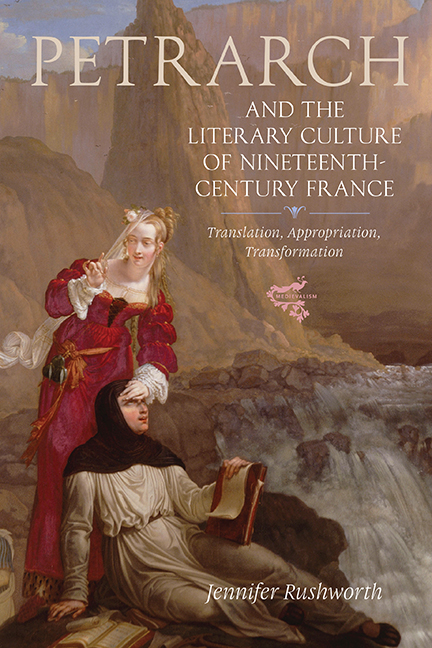 Petrarch and the Literary Culture of Nineteenth-Century France
Petrarch and the Literary Culture of Nineteenth-Century France Book contents
- Frontmatter
- Dedication
- Contents
- Acknowledgements
- Note on English Translations
- Introduction: Local History, Local Stories
- I Translations
- 1 Complete Translations of Petrarch's Canzoniere
- 2 Partial Translations of Petrarch's Canzoniere
- 3 Finding Laura in the Triumphi and Petrarch's Latin Works
- 4 Petrarch and Avignon: The Fate of the Sine nomine and RVF 136–8
- II Rewritings
- Conclusion: Petrarch and Patriotism
- Appendix 1 A Chronological Survey of Translations of Petrarch's Italian Poetry (the Canzoniere and Triumphi) between 1764 and 1903 in France
- Appendix 2 Translations of the Opening Stanza of RVF 126 from Voltaire (1756) to Brisset (1903)
- Bibliography
- Index
- Miscellaneous Endmatter
2 - Partial Translations of Petrarch's Canzoniere
from I - Translations
Published online by Cambridge University Press: 09 May 2017
- Frontmatter
- Dedication
- Contents
- Acknowledgements
- Note on English Translations
- Introduction: Local History, Local Stories
- I Translations
- 1 Complete Translations of Petrarch's Canzoniere
- 2 Partial Translations of Petrarch's Canzoniere
- 3 Finding Laura in the Triumphi and Petrarch's Latin Works
- 4 Petrarch and Avignon: The Fate of the Sine nomine and RVF 136–8
- II Rewritings
- Conclusion: Petrarch and Patriotism
- Appendix 1 A Chronological Survey of Translations of Petrarch's Italian Poetry (the Canzoniere and Triumphi) between 1764 and 1903 in France
- Appendix 2 Translations of the Opening Stanza of RVF 126 from Voltaire (1756) to Brisset (1903)
- Bibliography
- Index
- Miscellaneous Endmatter
Summary
INCOMPLETE TRANSLATIONS of Petrarch's Canzoniere suggest a process of selection and preference that is largely absent from the projects of complete translations of the Canzoniere discussed in the previous chapter. Incomplete translations bear witness to choices and decisions made by translators faced with a collection that they do not wish to replicate in its entirety, revealing varying levels of familiarity, preferential treatment, and avoidance. Incomplete translations often also create a new order and narrative which are potentially at odds with the structure desired by the original poet. This type of disorder is particularly visible in translations which do not maintain the Canzoniere's macro-narrative penitential frame, from RVF 1 (an introductory sonnet addressed to readers and expressing repentance for past, youthful error) to RVF 366 (a canzone addressed to the Virgin Mary and a rejection of Laura). Critics have argued about whether the end of the Canzoniere represents a true conversion from earthly to divine love or, instead, a desire for conversion that is suspended, interrupted, and incomplete. This type of argument does not seem to have detained French translators of Petrarch, who most often dismantled this penitential frame entirely, either by omitting RVF 366 (a common choice), by reordering the poems according to different priorities, or, in extreme cases, by translating only a few sonnets in isolation and entirely out of context. This last example calls into question the broader relationship between incompletion and meaning. In the case of highly selective translations, the burden of distilling the essence of Petrarch is placed on a mere few poems. The choice of appropriate poems for this task is, in such cases, highly charged, but was helped in the nineteenth century by an already more narrow understanding of who Petrarch was and what his poetry represented. Petrarch, for most translators, was and was to remain a love poet and author of sonnets. From this perspective RVF 366, a canzone ostensibly rejecting both earthly love and Laura explicitly, was predictably unwelcome and all too easily sidelined, while one or two sonnets could, conversely, be celebrated as the essence of his art.
- Type
- Chapter
- Information
- Petrarch and the Literary Culture of Nineteenth-Century FranceTranslation, Appropriation, Transformation, pp. 51 - 90Publisher: Boydell & BrewerPrint publication year: 2017


